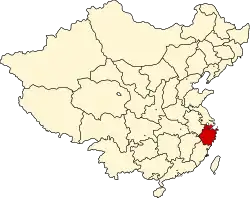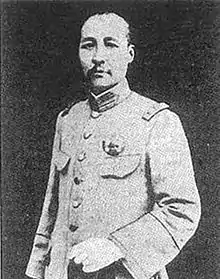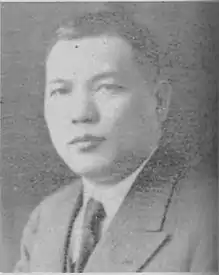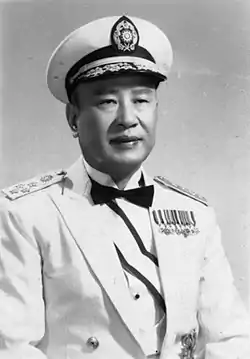Zhejiang Province
浙江省 | |
|---|---|
 Map of Chekiang Province | |
| Coordinates: 29°00′N 120°00′E / 29.000°N 120.000°E | |
| Country | Republic of China (de jure) |
| Capital | Hangzhou (de jure)[lower-alpha 1] |
| County | List
|
| Area | |
| • Total | 101,800 km2 (39,300 sq mi) |
| Population (1954) | |
| • Total | 1,700 |

Zhejiang or Chekiang is a de jure province in the Republic of China according to the ROC law, as the ROC government formally claims to be the legitimate government of the whole China. Founded after the collapse of the Qing dynasty, it was de facto abolished after the ROC Forces, ROC government officials and local residents were evacuated from Dachen to Taiwan in 1955 following the military defeat of the ROC by People's Liberation Army forces of the newly-founded People's Republic of China during the Battle of Dachen Archipelago.[2]
After the Chinese Civil War, the Kuomintang-led Republic of China government lost its control in Mainland China and only held several islands east of mainland Chekiang Province, including Yushan, Toumenshan, Yijiangshan, Dachen, Pishan and Nanji.[3] After losing the mainland, the Nationalists used the islands to stage commando raids into Zhejiang, occasionally penetrating as far as the area around Shanghai.[4] The county governments withdrawn to the islands from the mainland included seven counties, namely Wenling, Linhai, Huangyan, Pinyang, Sanmen, Yueqing and Yuhuan. Chiang Kai-shek, the late President of the Republic of China, appointed Hu Zongnan, the general of the ROC Armed Forces, to establish the "Government of Chekiang Province" on the Dachen Islands in September 1951. Its purpose was to fight against the mainland which was controlled by the Chinese Communist Party.
In 1952, the Chekiang Government reorganized the seven counties into four counties, which were Wenling, Linhai, Pinyang and Yuhuan. Sanmen county was reorganised as "Yushan Administrative Bureau", and "Zhuyu Administrative Bureau" was also established. These administrative bureaus were originally intended to be used as the "special region" for direct economic trading with Mainland China, however they were abolished one year later. In 1953, the Chekiang Government office moved to Taiwan. In 1955, the People's Liberation Army conquered Yijiangshan Island during the Battle of Yijiangshan Islands.
The Republic of China evacuated the military garrison and civil residents from Dachen and Nanji to the island of Taiwan with the assistance of the United States Seventh Fleet. The Chekiang Government on Taiwan was abolished soon afterwards, and the People's Republic of China successfully occupied the offshore islands, establishing control over the whole of Zhejiang Province.[5][6] However, the ROC does not recognize changes in administrative divisions made by the PRC, including this province, official maps of the ROC government shows Chekiang Province in its pre-1949 boundaries.
List of governors
Non-partisan/ unknown Unity Party Republican Party Military/ Warlords Kuomintang/ National Revolutionary Army
Military governors
| № | Portrait | Name (Birth–Death) |
Term of office | Political party | |
|---|---|---|---|---|---|
| 1 |  |
Tang Shouqian 湯壽潛 (1856–1917) |
4 November 1911 (nominated on 4 November 1911)[7] | 1 January 1912[7] | |
| Served as provincial military governor (dudu 都督)[7] | |||||
| 2 |  |
Jiang Zungui 蔣尊簋 (1882–1931) |
12 July 1912 (nominated on 16 January 1912)[7] | 23 July 1912[7] | Unity Party |
| Also served as head of the civil government during his tenure as military governor.[7] | |||||
| 3 |  |
Zhu Rui 朱瑞 (1883–1916) |
23 July 1912[7] | 11 April 1916[7] | Republican Party |
| Served as provincial general (jiangjun 將軍) from 30 June 1914; also served as head of the civil government 23 July 1912 – 10 September 1913. Eventually fled the province.[7] | |||||
| 4 | Qu Yingguang 屈映光 (1881–1973) |
14 April 1916 (nominated on 12 April 1916)[7] | 5 May 1916[7] | ||
| Acting military governor. Also served as de facto head of the civil government from 10 September 1913 to 6 July 1916, and as "pacification commissioner" (xun'anshi 巡按使) from 25 May 1914[7] | |||||
| 5 |  |
Lü Gongwang 呂公望 (1879–1954) |
6 July 1916 (nominated on 5 May 1916)[7] | 1 January 1917[7] | |
| Also served as de facto head of the civil government, namely "provincial head" (shengzhang 省長) during his tenure.[7] | |||||
| 6 |  |
Yang Shande 楊善德 (1873–1919) |
1 January 1917[7] | 13 August 1919[7] | Anhui clique |
| Died in office.[7] | |||||
| 7 |  |
Lu Yongxiang 盧永祥 Lú Yǒngxiáng (1867–1933) |
14 August 1919[7] | 20 September 1924[7] | Anhui clique |
| Served as "provincial superintendent" (duban 督辦) from 20 June 1922.[7] | |||||
| 8 |  |
Sun Chuanfang 孫傳芳 Sūn Chuánfāng (1885–1935) |
20ß September 1924[7] | 19 December 1926[7] | Zhili clique |
| Sun initially served as "provincial supervisor" (duli 督理), and as "provincial superintendent" (duban 督辦) from 16 January 1925.[7] He mostly ruled through subordinates, most notably appointing Lu Xiangting as "military commander-in-chief" (de facto military governor) in January 1926.[8] | |||||
| (9) | Lu Xiangting | 25 January 1926[8] | ? | Zhili clique | |
| Served as "military commander-in-chief" of the province.[8] | |||||
| 10 | Jiang Zungui | 19 December 1926[7] | 29 December 1926[7] | Zhili clique | |
| 11 | Meng Zhaoyue | 29 December 1926[7] | 17 February 1927[7] | Zhili clique | |
Civil governors
| № | Portrait | Name (Birth–Death) |
Term of office | Political party | |
|---|---|---|---|---|---|
| 1 |  |
Lü Gongwang 呂公望 (1879–1954) |
1916 | January 1917 | |
| 2 |  |
Qi Yaoshan 齊耀珊 (1865–1954) |
January 1917 | 24 June 1920 | |
| 3 | Shen Jinjiani 沈金鑒 (1875–1924) |
24 June 1920 | 29 October 1922 | ||
| 4 | Zhang Zaiyang 張載揚 |
29 October 1922 | ? | ||
| 5 |  |
Xia Chao 夏超 (1882-1926) |
1924 | 23 October 1926 | Zhili clique |
| NRA | |||||
| 6 |  |
Chen Yi 陳儀 Chén Yí (1883-1950) |
October 1925 | July 1927 | Zhili clique |
| NRA | |||||
Chairperson of the Provincial Government
| № | Portrait | Name (Birth–Death) |
Term of office | Political party | |
|---|---|---|---|---|---|
| 1 |  |
Zhang Renjie 張靜江 (1877–1950) |
27 July 1927 | 5 October 1927 | Kuomintang |
| 2 | He Yingqin 何應欽 Hé Yìngqīn (1890–1987) |
5 October 1927 | 7 November 1928 | Kuomintang | |
| (1) |  |
Zhang Renjie 張靜江 (1877–1950) |
7 November 1928 | 4 December 1930 | Kuomintang |
| 3 | Zhang Nanxian 張難先 (1873–1968) |
4 December 1930 | 15 December 1931 | Kuomintang | |
| 4 |  |
Lu Diping 魯滌平 (1887–1935) |
15 December 1931 | 12 December 1934 | Kuomintang |
| 5 |  |
Huang Shaohong 黃紹竑 (1895–1966) |
12 December 1934 | 25 July 1936 | Kuomintang |
| 6 |  |
Bai Chongxi 白崇禧 (1893–1966) |
25 July 1936 | 6 September 1936 | Kuomintang |
| Refused to take office; Director of Civil Affairs Department Xu Qingfu acted as Chairperson. | |||||
| (5) |  |
Huang Shaohong 黃紹竑 (1895–1966) |
6 September 1936 | 2 December 1936 | Kuomintang |
| 7 |  |
Zhu Jiahua 朱家驊 Zhū Jiāhuá (1893–1963) |
12 December 1934 | 26 November 1937 | Kuomintang |
| (5) |  |
Huang Shaohong 黃紹竑 (1895–1966) |
26 November 1937 | 26 March 1946 | Kuomintang |
| 8 |  |
Shen Honglie 沈鴻烈 (1882–1969) |
26 March 1946 | 22 June 1948 | Kuomintang |
| 9 |  |
Chen Yi 陳儀 Chén Yí (1883-1950) |
22 June 1948 | 21 February 1949 | Kuomintang |
| 10 | Zhou Yan 周喦 |
21 February 1949 | 6 December 1949 | Kuomintang | |
| 11 | Shi Jue 石覺 (1908-1986) |
7 December 1949 | 13 May 1950 | Kuomintang | |
| 12 |  |
Hu Zongnan 胡宗南 (1896-1962) |
19 October 1950 | 23 July 1953 | Kuomintang |
| Evacuated to Taiwan 23 July 1953. | |||||
See also
Notes
References
- ↑ 蔣經國巡視大陳島 (Chinese Version)
- ↑ 國民政府的浙江省政府 (Chinese Version)
- ↑ "三軍渡海攻占一江山島 (Chinese Version)". Archived from the original on 2016-03-03. Retrieved 2008-03-08.
- ↑ Domes, Jurgen. Peng Te-huai: The Man and the Image, London: C. Hurst & Company. 1985. ISBN 0-905838-99-8. p.66
- ↑ 1955: US evacuates Pacific islands
- ↑ Tachen Island Evacuation History
- 1 2 3 4 5 6 7 8 9 10 11 12 13 14 15 16 17 18 19 20 21 22 23 24 25 26 27 28 "Military and Civilian Governors of Zhejiang 1911-1949". Chinaknowledge. Retrieved 2 November 2018.
- 1 2 3 Jordan (1976), p. 132.
Bibliography
- Jordan, Donald A. (1976). "Provincialism within the Chinese National Revolution: The Case of Chekiang, 1926–1927". In F. Gilbert Chan; Thomas H. Etzold (eds.). China in the 1920s. Nationalism and Revolution. New York City, London: Franklin Watts. ISBN 0-531-05383-0.
External links
- . Encyclopædia Britannica. Vol. 6 (11th ed.). 1911. p. 23.